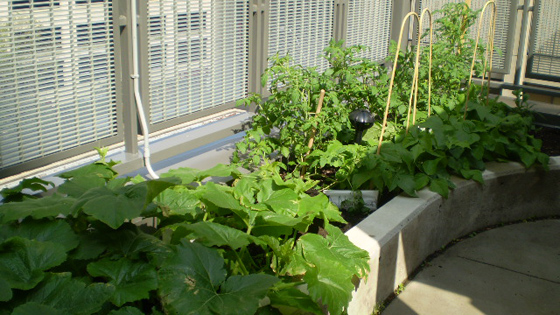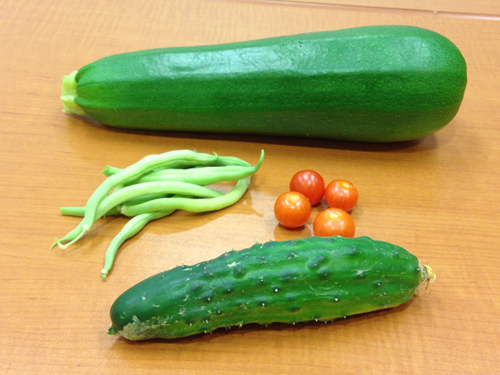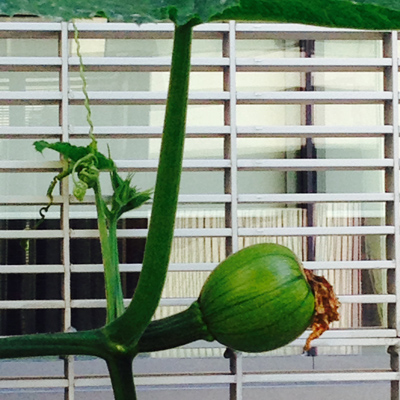
Patients and staff in the 5 South Geriatric Psychiatry Unit at Toronto Rehab tended to a vegetable and herb garden on the University Centre rooftop. (Photo: Geriatric Psychiatry Unit)
This summer the Toronto Rehab Geriatric Psychiatry Inpatient Unit staff began using the University Centre rooftop garden as part of their patients' therapy.
The unit specializes in assessing and treating people with Alzheimer's disease and other types of dementia, who are experiencing challenging behavioural symptoms, referred to as 'responsive behaviours'. These behaviours are often an effort to communicate something, like pain, when the changes in their brain no longer allow them to effectively express themselves with words.
The inter-professional team provides expertise in addressing the full range of factors that may be influencing the behaviour of the person with dementia, including physical, cognitive, emotional, environmental and social issues.
Tackling behavioural challenges
"We work with individuals to manage behaviours such as wandering and hoarding, aggression, resistance with personal care and just general agitation," says Amy Cockburn, an occupational therapist in the Geriatric Psychiatry Unit.
Patients come to the unit from long-term care homes, acute care, or from their own home. When immediate caregivers begin to struggle to manage responsive behaviours, the Geriatric Psychiatry team will assess pharmacological changes and different behavioural approaches. They will then give these care tips back to those providing long-term care.
"We want to find activities that are meaningful, that they can engage in, and that can also be a source of calm for them, which is why we decided to try gardening," Cockburn says.
Therapy through gardening

The vegetables grown in the garden were used in other programs for patients in the unit, such as a tea social and Canada Day celebration. (Photo: Geriatric Psychiatry Unit)
The familiarity and sense of calm brought on by gardening has made it a good activity for tackling some of the responsive behaviours that accompany dementia.
"For the patients in this age group, many of them did a lot of gardening whether it was at home or in their home countries, so it's a familiar activity for them," says Willie Si, recreation therapist in the Geriatric Psychiatry Unit.
"For some patients they also have a need to be productive," Cockburn adds. "There are such limited opportunities in institutions to have something that fulfils that role of giving them a job to do, so there are patients who like to engage in some form of manual labour that they used to be able to engage in."
Communicating in new ways
Many of the patients admitted to the unit also have deteriorated cognitive skills as a result of Alzheimer's disease or other dementias, and some patients may not speak English as a first language.
"Gardening is an activity that is very sensory and our patients and staff can find joy in doing it together despite any verbal limitations that may exist," says Robin Shan, program service manager of the Geriatric Psychiatry Unit. "There may be more complex tasks that they can no longer do, but we can gauge the activities with gardening so it's not a source of frustration."
Using gardening as a tool to address responsive behaviours has also allowed patients to take on a role that is often lost to those with dementia.
"I think it shifts the dynamic in terms of being in a caring role rather than always being the person receiving care," says Cockburn. "They may not be able to go to the bathroom on their own, or shower, or change, or feed themselves. But when they're out there it's about them caring for the plants."
A bountiful garden

Patients and staff grew a variety of herbs and vegetables, including a pumpkin for the fall season. (Photo: Geriatric Psychiatry Unit)
This summer, patients and staff grew zucchini, cherry tomatoes, beans, dill cucumbers, and most recently a pumpkin. And, the patients had an opportunity to bake with these ingredients and enjoy the finished product.
The team is already making plans for next year's garden and looking to add colour with different varieties of flowers.
Click here to learn more about Geriatric Psychiatry Inpatient Service
